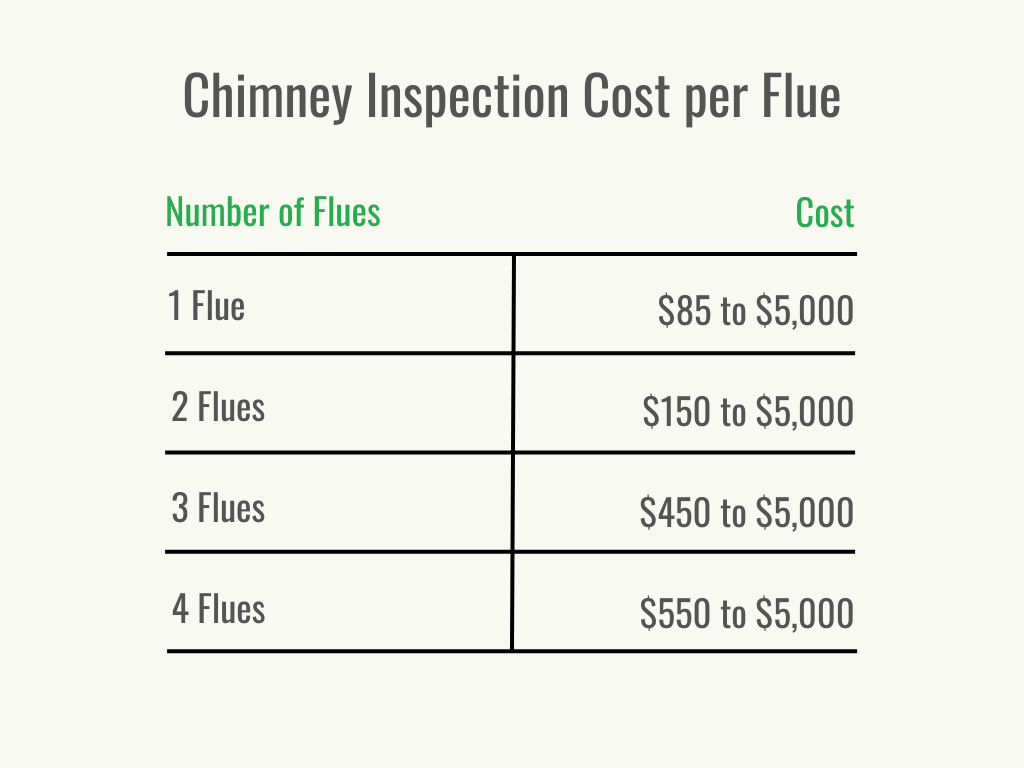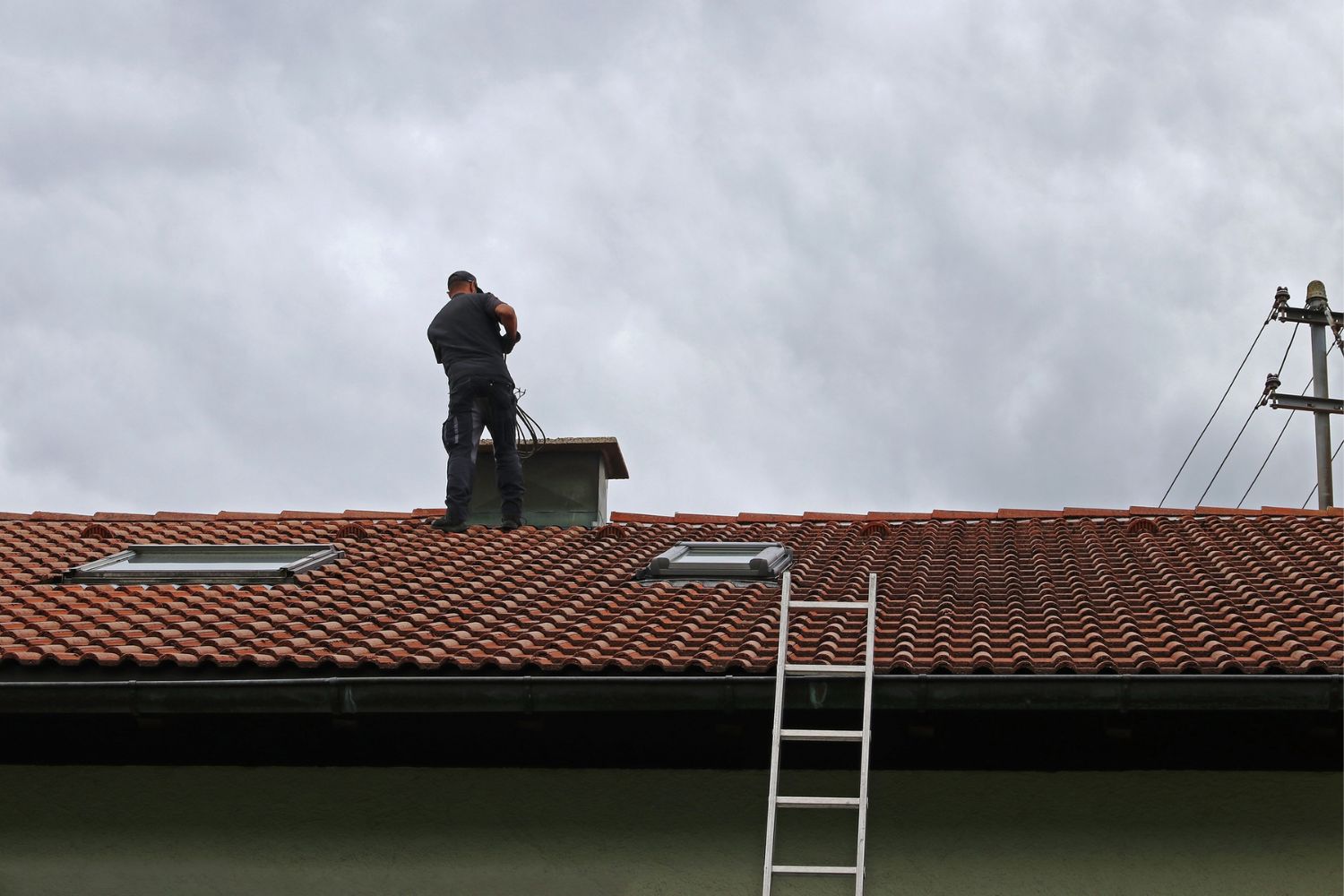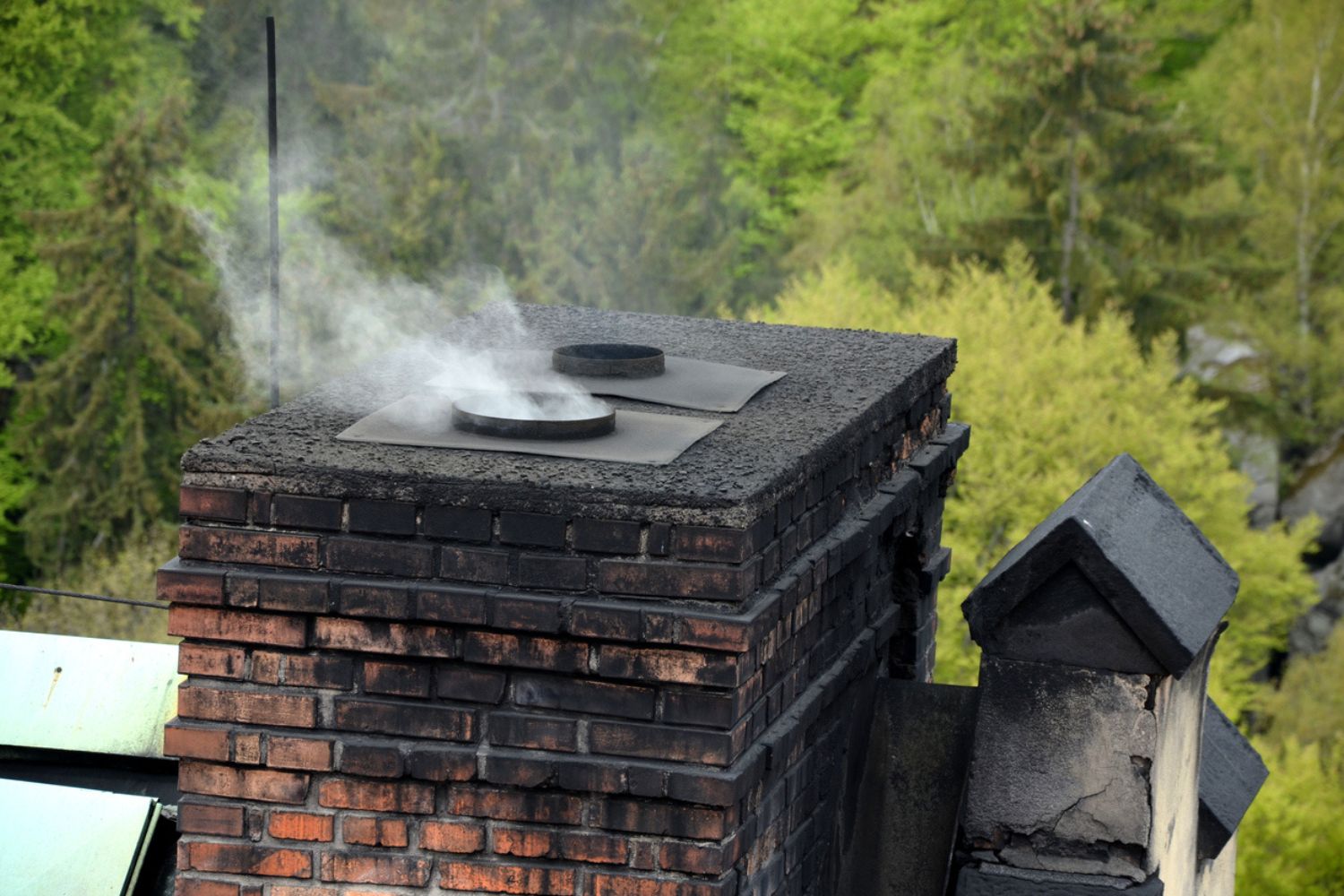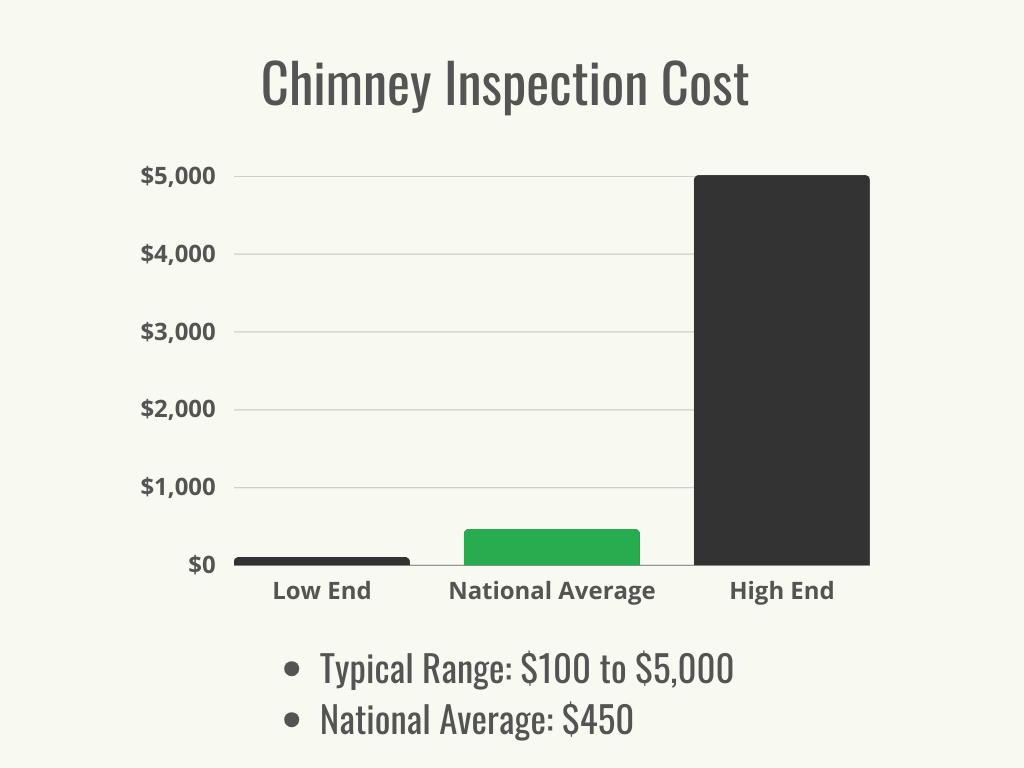We may earn revenue from the products available on this page and participate in affiliate programs. Learn More ›
Highlights
- The typical cost range for chimney inspection is $100 to $5,000, with a national average of $450.
- The most significant cost factors for chimney inspection are the inspection level, chimney size, number of flues, and accessibility.
- Some signs that it’s time for a chimney inspection include burning odors, excessive smoke, poorly burning fires, creosote buildup, and chimney damage. Other reasons for a chimney inspection include annual maintenance and a home purchase or sale.
- Chimney inspections will need to be done by chimney professionals with the proper tools and training to ensure the chimney is in safe working condition.
Fireplaces and heating systems provide essential functions within a home, made possible by the presence of a chimney. Chimneys remove the smoke and chemical byproducts caused by burning oil, gas, or wood in a fireplace or furnace. To keep a chimney safe and sound, experts emphasize the importance of a chimney inspection every year before a fireplace or heater is put to use.
So, how much does a chimney inspection cost? According to Angi and HomeAdvisor, a chimney inspection costs anywhere from $100 to $5,000, with $450 being the average cost of chimney inspection. The cost of a fireplace and chimney inspection depends on numerous factors, such as the size of the chimney, the number of flues it has, and the potential need for waterproofing. There are three levels of chimney inspections homeowners can choose from when hiring a chimney inspection service.
Factors in Calculating Chimney Inspection Cost
How much should a chimney inspection cost? It depends on the level of inspection, chimney size, number of flues, and accessibility of the chimney itself.
Inspection Level
How much are chimney inspections? Thee exact cost will depend on the chimney inspection level, of which there are three. The condition of the chimney dictates which level is necessary.
- A level one inspection costs $100 to $950 and is generally a routine chimney inspection completed on an annual basis.
- A level two inspection costs between $200 and $1,000 and goes a step further to include a more extensive investigation into potential structural issues caused by recent damage.
- Finally, a level three inspection costs $500 to $5,000 and looks at every square inch of the chimney, inside and out. This may require removing walls or portions of the chimney to access and inspect each part fully.
Chimney Size
The size of a chimney is another factor in the total chimney and fireplace inspection cost. Large chimneys take longer to inspect; therefore, the larger the chimney, the higher the inspection cost. Since the inspector will be looking for cracks and damage, every surface of the chimney structure needs to be examined.
Number of Flues
A chimney flue is the chamber or pipe inside the chimney through which the smoke travels. Residential chimneys usually have between one and four flues, with each flue typically serving a separate system, such as a fireplace, wood stove, or HVAC. The more flues, the longer an inspection will take; therefore, the chimney inspection price depends on the number of flues.
For example, a level one chimney inspection might cost between $85 and $250 for one flue, $150 and $550 for two flues, $450 and $750 for three flues, and $550 and $950 for four flues. This increase in pricing based on the number of flues applies to level two and level three inspections as well.

Accessibility
Chimney accessibility also plays a part in answering the question “How much is a fireplace inspection?” If the chimney is easily accessible from an extension ladder, homeowners can expect to pay the inspector’s standard rates, but if the inspector has to scale a steep roof, work within a tight area, or face another difficulty in accessing a chimney, the inspection cost will be slightly higher to reflect this added effort. In some cases, scaffolding or a motorized lift might be necessary to reach a chimney, resulting in increased costs as well.
Additional Costs and Considerations
How much does it cost to have a chimney inspected? In addition to the size and accessibility of the chimney, there are other elements that may affect the cost. For example, if cleaning is needed before the inspection or repairs are needed after, there will likely be additional costs. Waterproofing and camera inspection could also add to the total chimney inspection cost.
Chimney Cleaning
In most cases, chimney inspection and cleaning are both included in the cost of a level one and level two inspection. After the cleaning, the surfaces are clear and an accurate investigation can be completed. If a separate chimney cleaning service is necessary, homeowners can expect to pay between $130 and $365.
During a cleaning, a chimney professional will shake loose built-up creosote, soot, and other debris from the top of the chimney and then vacuum them up from the bottom. If excess creosote is present that requires extra cleaning, the total chimney sweep cost can reach up to $800.
Chimney Repairs
If any damage is found during a chimney inspection, the homeowner will be notified and informed of any repairs that are recommended. According to Russ Dimmitt, director of education for the Chimney Safety Institute of America (CSIA), “As part of the inspection process…the homeowner will receive a detailed report referencing codes, standards, and the manufacturer’s instruction requirements. They will also receive photos of any deficiencies discovered in the inspection process.”
The cost to have a fireplace inspected is separate from any chimney repair costs. If the inspection report comes back with recommended repairs, they will likely cost anywhere from $90 to $2,000.
- The cost to replace a chimney cap (which closes off the top of the flue) is about $300, and repairing or installing a new crown (a flat area directly underneath the chimney cap) costs about $900.
- More extensive masonry repair costs around $2,000.
- If the liner in the chimney flue is worn down, for example, a replacement will cost $2,500 or so.
- In a worst-case scenario, the inspection might find that a complete chimney rebuild is required, which can cost upwards of $5,000. The cost to remove a chimney altogether is $1,000 to $10,000.
Waterproofing
Some homeowners opt to waterproof their chimney to protect the brick or stone from water intrusion. As chimneys are exposed to water over a long period of time, the tiny holes inside of bricks or stones can grow and eventually allow water inside. This water will inevitably find its way to the interior chimney flue and cause further damage.
Homeowners will want to waterproof their chimney right after it has been inspected; otherwise, the waterproofing might cover up structural issues that need to be repaired. Adding waterproofing after the inspection process is complete will increase the overall cost.
Camera Inspection
Inspectors may recommend using a camera for chimney inspection to get a better look at the internal chimney stack. While this cost is usually included in a level two inspection, homeowners can expect to pay $200 to $400 for camera inspection in one flue if they are charged separately. Camera inspection of a chimney with four flues can cost up to $1,000. The inspector will share a copy of the chimney inspection video along with the final inspection report.
Animal Removal
It’s not uncommon for animals such as birds, squirrels, or bats to nest or get stuck inside a chimney. If any animals are found in the chimney during inspection, these will need to be removed by one of the best wildlife removal services (such as Critter Control). This service can cost between $155 and $575, depending on the type of animal that is being removed.

Types of Chimney Inspections
How much does it cost to have a fireplace inspected? Chimney inspections vary by level of detail from level one to level three. Level one is the least invasive and is a surface-area inspection, while level three requires inspection of every part of the chimney, inside and out. Level two lands right in the middle. The appropriate level of chimney inspection depends on the condition of the chimney.
| Inspection Type | Average Cost (Materials and Labor) |
| Level one | $100 to $950 |
| Level two | $200 to $1,000 |
| Level three | $500 to $5,000 |
Level One
A level one chimney inspection is a basic inspection that costs between $100 and $950 and is typically completed on an annual basis as part of a home’s safety routine. “Level one inspections are used in the case of sweeping a chimney or replacing the appliance with one of similar type, input rating, or efficiency,” says Dimmitt. “This level includes all readily accessible areas of the appliance and venting system.”
If a fireplace is used during the winter, a level one annual inspection is recommended in the fall before the chimney is put to use. It’s also recommended to make sure the chimney is in good working order after homeowners purchase a new home. The inspection includes sweeping the entire chimney clean and visually inspecting all visible surfaces. The inspector will look for cracks, excessive creosote buildup, or other signs of wear and tear and then recommend any necessary repairs.
Level Two
A chimney level two inspection costs around $200 for a single-flue chimney and up to $1,000 for multiple flues. A level two chimney inspection is recommended for chimneys that have experienced damage from a fire or storm and may also be recommended by an inspector who finds extensive damage during a level one inspection. “Level two inspections are more thorough and include all components of the level one inspection and additional accessible areas of the chimney, such as parts of the chimney above the roof as well as in the attic and basement,” Dimmitt adds.
A level two inspection starts with a cleaning service to expose any damage. From there, the inspector will look at the top and bottom of the chimney structure to assess the damage. The inspector may also use a camera to look for damage inside the structure.
Level Three
The most thorough type of chimney inspection is a level three, which usually costs between $500 and $5,000. This inspection is for rare situations when a chimney has experienced extensive structural damage. According to Dimmitt, “Level three inspections are called for when level one and level two inspections are insufficient to determine the suitability of the chimney for use. In level three inspections, partial disassembly of the chimney or walls in the home may be necessary to access the areas of concern.”
Once the chimney’s structural issues have been identified, they can be fixed along with any drywall or other materials that have been removed.

Do I need a chimney inspection?
Unless a chimney is leaking or visibly damaged, completing a chimney inspection might be the last thing on a homeowner’s mind. Forgoing chimney inspections, however, poses a risk to everyone inside a home and to the home itself. Dimmitt advises, “If you smell or see smoke or fumes from the chimney inside the home, if you notice charring or drying of wood or other combustibles near your chimney, or you hear sounds from your chimney, these need attention as soon as possible. Use of the chimney should be stopped until these problems are diagnosed and remedied.” There are several situations that indicate that a fireplace and chimney inspection is warranted.
Burning Odor
Noticing a burning odor while using a fireplace or heating system is a sign an inspection is needed. The smell may be due to the buildup of creosote or other chemicals inside the fireplace. These conditions can lead to chimney fires if left unaddressed. A professional will inspect the chimney and find the root cause of the burning smell—a thorough chimney cleaning will likely be recommended.
Excessive Smoke
If a homeowner notices excessive smoke leaving their chimney or fireplace smoke entering their home, it’s recommended they contact a chimney inspector immediately. Excessive smoke is usually a sign of an air ventilation problem but could also be a result of water seeping into the flue or something blocking the flue.
Poorly Burning Fires
If a fireplace has a sudden change in performance, the system needs to be checked out. Poorly burning fires or fires that won’t start at all indicate an issue with a chimney’s cleanliness or damage. A professional chimney inspector will test the function of the fireplace and determine the cause of the problem.
Creosote Buildup
Creosote is a carcinogenic byproduct produced by burning wood. When wood is burned in a fireplace, oils in the wood are released in the smoke and build up on the inside of the fireplace in the form of creosote. If the creosote is not regularly cleaned and removed, the buildup can create obstructions in a chimney that could lead to a fire. If the chimney inspector does not remove built-up creosote as part of the inspection, homeowners may consider using one of the best creosote removers or hiring a separate chimney cleaning specialist.
Potential Chimney Damage
Whether after a storm, earthquake, or another natural disaster, a chimney will need to be inspected if it has potentially been damaged. These types of incidents can destroy the structural integrity of a chimney, meaning even if the chimney looks okay and functions well in the present, it could collapse in the future.
Annual Maintenance
“The National Fire Protection Association states that chimneys, fireplaces, and vents shall be inspected at least annually and cleaning, maintenance, and repairs shall be done if necessary,” says Dimmitt. An annual chimney inspection reduces the risk of fire and carbon monoxide–related incidents in a home. The inspection will note issues with the chimney that could cause a chimney fire or smoke entrapment, make recommendations such as removing creosote buildup and flue blockages or repairing cracks and damage. Annual chimney inspections are best completed right before winter, when a chimney starts to be used regularly.
Home Purchase or Sale
A chimney inspection might be required as part of a home purchasing process by the particular state, the home insurance company, or even the home buyer. This type of inspection is usually more thorough than an annual inspection, as any issues must be resolved prior to the execution of the sale or issuance of the certificate of occupancy.

Chimney Inspection: DIY vs. Hiring a Professional
A DIY chimney inspection is not recommended. While a homeowner might take on small tasks associated with their chimney, like cleaning up soot around the firebox or taking note of changes in performance, most chimney-related tasks should be reserved for qualified chimney professionals.
There is a lot at stake when it comes to the condition of a chimney and the associated fireplace or heating system. Chimneys that have not been properly maintained pose a serious risk to the household residents. Unkempt or damaged chimneys can create chimney fires or conditions that lead to carbon dioxide inhalation.
For the safety and soundness of their home, it’s recommended that homeowners hire a local chimney inspector near them to examine the condition of their chimney on an annual basis. The inspector will note any issues with cleanliness or damage that need to be addressed in order to keep the home and residents out of harm’s way.
How to Save Money on Chimney Inspection Cost
While most aspects of a chimney inspection are best completed by a professional, there are a few things homeowners can do to save money throughout the process.
- Don’t neglect maintenance. Keep up with annual chimney inspections, so necessary repairs do not worsen over time and end up costing more.
- Keep to a cleaning routine. Clean up the visible soot around the firebox anytime there is buildup.
- Schedule in advance. Waiting to schedule the service until just before the fireplace will be used may result in additional fees.
- Bundle services. Scheduling inspection and cleaning at the same time can result in lower costs, since the professional has to travel to the home only one time.
- Tidy up ahead of time. Make sure the areas around the chimney and fireplace are clear—if it is difficult for the professional to access the chimney or fireplace, this may result in higher labor costs.
Questions to Ask About Chimney Inspection
Before hiring a chimney expert to inspect or clean a chimney, homeowners will want to fully vet the company and completely understand what is included in the process. Asking the inspector a few important questions is a good place to start.
- Are you licensed and insured to complete this type of work?
- How long has the company been in business?
- How many chimney inspections have you completed?
- Do you offer written quotes and contracts?
- How soon can you complete a chimney inspection?
- Does your chimney inspection include a chimney cleaning?
- Does your chimney inspection include a camera inspection?
- What equipment will you use during the inspection?
- Will you provide a detailed inspection report after the service is complete? Can I see a sample report?
- Are you able to make the recommended repairs to my chimney?
FAQs
Before hiring one of the best chimney cleaners or inspectors, it is important for homeowners to fully understand the inspection process. These frequently asked questions about the cost of chimney inspections and what the inspection involves provide more essential information.
Q. What’s involved in a chimney inspection?
During a chimney inspection, the inspector will examine every accessible part of the chimney, including the attached fireplace or heating system. They will note any buildup of soot or debris, check for structural soundness, and ensure the chimney is safe to use. If a more thorough inspection is necessary, the inspector will also check the internal chimney stack with a camera.
Q. How can I tell if my chimney needs cleaning?
When a chimney needs cleaning, it may exhibit some of the following symptoms:
- Oily spots on the walls
- Soot or ash buildup
- Restricted airflow
- Burned smell
- Poorly burning fires.
Contact a chimney inspector if your fireplace exhibits one or more of these issues.
Q. Is a chimney inspection part of a home inspection?
A brief chimney inspection is typically part of a home inspection. This includes a visual assessment of accessible areas of the chimney, from the roof and inside the home, but it does not include an in-depth look of each part of the chimney or the inside. For a comprehensive assessment, homeowners may want to consider hiring a professional chimney inspector.
Q. What happens if I don’t clean my chimney?
If a chimney isn’t cleaned on an annual basis, soot, ash, and creosote can build up inside the flue. These conditions can lead to a chimney fire or carbon monoxide inhalation. To prevent these undesirable outcomes, it’s recommended that homeowners have their chimneys cleaned and inspected each year.
Q. How often should a chimney be cleaned?
A chimney should be cleaned once a year. Some professionals recommend twice-a-year cleanings for oil or wood-burning fireplace chimneys. Ideally, homeowners should schedule a chimney professional to clean and inspect their chimney each fall before using the fireplace or heating system.
Q. Can I clean my chimney myself?
Homeowners can clean a small portion of a chimney themselves, such as removing the soot around an inactive firebox, but most chimney cleaning is best left to the professionals. A qualified chimney cleaner will have the right tools to clean a chimney from top to bottom and has the experience to remove heavy creosote buildup.
Sources: HomeAdvisor, Fixr, Angi, LawnStarter


